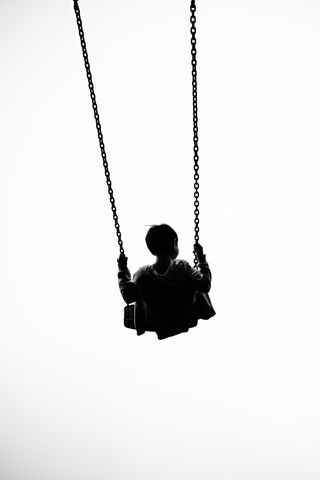Anger
Invisible Wounds of the Sensitive, Intense Child: Part 2
Some children's wounds remain unspoken and unnoticed.
Posted July 25, 2018 Reviewed by Ekua Hagan
Childhood wounding does not always take a physical form. Our society typically recognizes the horror of physical child neglect, but not the emotional pain that comes from toxic relationships.
Psychological damage can happen in invisible ways, from a parent’s lack of emotional awareness, subtle put-downs, allowance of dysfunctional sibling rivalries, or over-control. Children who are emotionally gifted, either due to their innate wiring or necessary adaptation, are more likely to fall into certain roles and dynamics, such as becoming enmeshed or parentified. Their emotional trauma may not be a result of conscious or malicious acts but remain unspoken of and unnoticed for years.
The following are some other dysfunctional family dynamics that may affect an innately sensitive, empathic child. This might be a difficult read, but it will help us to understand the impact of not having our emotional needs met.
It is critical that we do not fall into the trap of simplistic or linear thinking, of blaming or victimizing. Instead, let’s see this as an opportunity to come closer to ourselves and our inner truth, and to make room for new insights that will help us heal and grow.
The Competitive Parents and the Oppressed Child
Parenthood is a roller coaster ride that comes with a myriad of emotions; from pride, joy, anger to grief. Although it is a taboo subject in society, it is not uncommon to feel jealous of one’s children.
For the aging parents, seeing their children’s youth, energy, and open possibilities also means being confronted with what they have lost. Jealousy can be a natural, even healthy human reaction to life changes.
Healthy parents can acknowledge their complicated feelings and understand that in parenting one can feel both loving and shaky, proud and jealous, and be wholeheartedly giving and inwardly insecure all at the same time. They can celebrate their children’s exuberance, beauty, talents, and competence in the world without having their insecurities get in the way.
For parents with limited emotional capacity, however, seeing a child’s growth becomes intimidating. Both men and women might feel threatened by their chronological timeline and bereave over their unlived lives. Facing an empty nest, their childhood wounds and unmet needs are stirred up, and they psychologically regress to a point where they see their child as a competitor.
These parents are stuck in a paradox: In one way, they wish their child would thrive so they could reaffirm their identity as a good caregiver, yet they feel threatened by their child’s being more successful, beautiful, or competent than they are. If they felt resentful towards the time and energy they had sacrificed, they might feel betrayed as the child moves towards independence. Parents who are not self-aware act out their toxic envy in dysfunctional ways, such as back-handed compliments, subtle put-downs, or the more explicit contempt and scorn.
Children look up to their parents, especially the same-sex parent. If who they see as a role model puts them down or punishes them for their accomplishments, they eventually internalize the disdain as self-hatred and low self-esteem.

The messages of oppression might be buried deep in the unconscious, but whenever adult children of competitive parents do well in life, they feel unexplainable guilt or shame. They might even sabotage their success, intentionally play small, to stay safe; Underachieving and the imposter syndrome are common.
While this does not excuse their behaviors, competitive parents are also victims of deprivation in their childhood. Because they have not experienced unconditional positive regard for their own flourishing, they are unable to give it freely. As Carl Jung puts it, nothing has a stronger influence psychologically on their environment, and especially on their children than the unlived lives of the parents.
“The past is a place of reference, not a place of residence; the past is a place of learning, not a place of living.”
― Roy T. Bennett, The Light in the Heart
The Scapegoating Dynamic and the Black Sheep
Challenges arise when an emotionally intense child is born into a neurotypical family who does not understand them; they are like apples that have fallen far from the trees.
These families are presented with a fork in the road; They can reject their child for their strangeness, or they rise to the occasion and allow themselves to be changed by their experience.
Andrew Solomon, who conducted over 4000 interviews with families, observed that having exceptional children exaggerates parental tendencies; those who would be bad parents become awful parents, but those who would be good parents often become extraordinary.
It takes strengths and maturity to learn to work with differences. Unfortunately, as a result of a myriad of factors from emotional incapacity to cultural confines, not all families can accept their child’s idiosyncrasies or celebrate their gifts.
In a healthy family, there should be enough room for each family member to express themselves as an individual. However, in some families, there is little tolerance for differences. This setup is unfortunate for the intense child.
Being scapegoated may not mean that your family members do not love you, or that they are intentionally trying to harm you. Their need to label you often comes from their vulnerabilities and the fear of their inadequacies.
Theorists of Systemic Family Therapy use the term "Identified Patient" (Minuchin et al., 1975) to describe the scapegoated person. Often, pointing the finger at one person as the cause of all evil is an unconscious strategy used by some family members to evade their own emotional pain.
Once the pattern is set, the family typically goes to great lengths to keep the dynamic that way — the scapegoat must remain the scapegoat — otherwise, the others would be forced to face their vulnerabilities. What this means is that when the scapegoat tries to walk away from this toxic dynamic, they may be met with subtle or not-so-subtle emotional revenge, manipulation, or blackmail.
If your family life from childhood leading up to today were being put on stage, would there be a kind of "fixed role" assigned to you? For example, were you "the emotional one," "the strange one," or "the sick one?"
Here are some of the signs that you have been scapegoated in the family:
- You are criticized for your natural attributes, such as your sensitive nature.
- Name-calling – you are always "the weird one," "the wild card," or "trouble."
- Your parents treat you differently from your siblings.
- Your mistakes are blown out of proportion or punished disproportionately.
- Your siblings bully you, or they "jokingly" mock you for your idiosyncrasies.
- No one intervenes or takes notice when others are bullying you.
- Your family does not know who you truly are beyond the superficial, and have shown little interest in knowing.
- When you thrive, get stronger, and more independent, you sense that your family members are intent on bringing you down or dismissing your achievements.
Children find their identity in what is reflected to them by their parents. Being treated as "the bad apple" all your life, you might find it hard to shake off this identity. Even when you move away from this, you may still carry with you mental or emotional repercussions from the past.
To heal from being scapegoated, you may zig-zag your way from denial to anger, and eventually freedom and release. You may intellectually understand that you are not the cause of problems in your family, but to shift the internalized shame requires more profound emotional healing. You must realize that the cause of chaos is not you, but your family’s repressed baggage, and it should never have been your responsibility as a child to resolve anything. Once you can let go of this, and reacquaint yourself with people who see and cherish you for who you are, you are on your way to reclaiming your own authentic life.
“When she tries to talk about her pain, she is told that she must be crazy. "Nothing bad has happened to you;' her family tells her Each day she begins to feel more and more like she doesn't know what is real. She stops trusting her feelings because no one else acknowledges them or hears her agony. Soon the pain becomes too great. She learns not to feel at all. This strong, lonely, desperate child learns to give up the senses that make all people feel alive. She begins to feel dead. ― Margaret Smith
Transcending Blame
If the above information rings true, it probably has stirred up discomfort. We do not want to bypass any feelings of hurt, but it is equally important not to be stuck in a disempowering position of blame or shame.
Perhaps you feel as if you had hoped, and was disappointed, but you keep on hoping.
You were loved and was betrayed, but you still believe in love.
Perhaps you were confused by the stream of changeable feelings towards the family that has never understood you.
Many of us suppress our natural feelings because it was silenced by our culture or upbringing.
To free ourselves from the burden of past trauma, let’s take a few moments to review what we think about anger, blame, and love.
First: Your feelings, especially anger and resentment, do not need justification.
No matter what it is, I would like you to know that your feelings need no justification.
It is a part of the human design that we suppress any anger directed at those we trust and depend on. From childhood, our mind is designed to do this without us even knowing. This is because, from an evolutionary perspective, the bond with our caregivers is a life-or-death matter. The idea that those we so rely on can "fail," or that we would do something to upset them, is unfathomably frightening.
Despite growing into adulthood, many of us remain stuck with an estranged relationship with anger. When anger comes, it is ladened with guilt and shame, so we suppress it before we even notice it. We binge eat, we numb ourselves, we get depressed, or we turn aggression towards ourselves and feel like a bad person. Then, sometimes our anger erupts in unexpected ways, impeding the relationships with those we love now.
Because we feel threatened by our rage, we often find ways to justify, or rationalize it away: “They did the best they could.” Yes, this is true, in fact, everyone is always trying the best they can, with the knowledge, capacity, and resources they have — and inevitably there will still be unmet needs and disappointment.
Most of us do not feel safe enough to touch anger. But by spending so much energy to hide from ourselves, we are taking a smaller slice of life and ended up feeling half-human.
We could see anger as a kind of universal energy that goes around, and when it enters our system, it needs to be allowed to go through, and then released.
Your feelings do not need reasons to be legitimate.
Second: Understand that anger does not equate to blame.
When anger surges, our mind has a hidden belief: “Someone must have done something wrong.” Following that, it goes: “If it is not others’ fault, then it must be mine.” However, this is not true. Our world is not perfect, it is not supposed to be, and it is the most natural that we have an anger response— it is a healthy and necessary part of nature.

While we do not excuse emotional abuse; caregivers who mistreat their children are likely traumatized as a child. Trans-generational trauma is the notion of unhealed issues can be passed down. According to Fromm (2012), the author of Lost in Transmission: Studies of Trauma Across Generations, what human beings cannot contain their experience—what has been traumatically overwhelming and unbearable — often gets passed onto the next generation. Physically, unhealed patterns may be passed on through epigenetics. Psychologically, the parents or grandparents can pass down trauma through maintaining toxic silence about specific issues, or, on the flip side, over disclosing their past traumas to their children and reinforcing the idea that the world is a dangerous place.
From a wider, spiritual perspective, we might consider separating our parents’ toxic behaviors from the people they are. Their dysfunctions stem from a pain that has been passed down. Perhaps we could see our parents not as "our parents," but ill-equipped, under-resourced fellow human, affected a universal body of pain, and none of us are ultimately immune from it.
When we feel pain, we could also remember that though it feels personal to us, we are entirely innocent and independent from it. We might have inherited trauma through our family, and are carrying a share of the collective human suffering. The trauma does not define us; it is a separate entity that has been attached to us. As it could enter our psyche, so could it leave our spirit.
Yeah, where you say, “Oh, but wait a minute, someone lived in this house before me,” in essence. “And some of that stuff is not mine. Actually, this is not mine. That’s my mom’s. This is not mine.”
— Rev Kyodo William
Ultimately, we ought to remember this: Anger does not negate love.
Relationships are complex. It is rarely just one thing. Love and hate, anger and intimacy, closeness and distance are not mutually exclusive. We both love and hate, hope and despair. We desire both closeness and distance.
Anger is a part of love.
To truly love someone, including ourselves, we must also integrate anger as a part of our whole.
If we could go through the painful process of lucidly embracing what the child in us was/is furious about, we will inevitably get to the next steps of the psychological and spiritual maturation process — grieving and accepting.
Accepting does not mean surrendering to defeat or allowing abuse; it just means seeing what it. And "seeing what is" is the first step to "loving what is."
If we could accept reality, we are no longer in denial. When the disappointment is digested through, we will have to grieve what we had needed but did not get, and then be released from the tyranny of false expectations.
Through this process, our capacity to love others is deepened. We will find ourselves triggered less often in our daily life because we have stopped projecting an idealized version of others onto the "real" people that they are.

Our love is now based on the truth of who people really are— both "glory and terror," both their most delightful qualities and their infuriating limitations. Our relationship is no longer so clouded by an illusion, and not tainted by endless cycles of false expectations and disappointment.
Temporarily, it may feel as if anger diminishes love, but in the long run, being able to have anger in our emotional repertoire will only enhance our capacity for true love — for everything — ourselves, those who have hurt us, and those who love us, the wider community.
Allowing anger to go through and pass us is alchemy.
It is the opposite of evil, but the doorway to vaster love.
By releasing condemnation and resentment, we free ourselves. This does not mean we do not set boundaries, or have to be in a relationship with those who harm and manipulate us. It does not excuse or condone any abuse, but it is only by letting ourselves off the hook, could we free energy up into writing our authentic life script.

If we could accept our own anger, of our parents’ limitations, and of the trauma embedded in our collective humanity across history— we are liberating not just ourselves, but we are also doing something of transpersonal meaning. Like a ripple that will evolve into a wave, you could be contributing to a universal healing force in the world.
Our history is a part of us, but it does not represent or define us.
At any given moment, we could give ourselves the permission to be a free, autonomous being, not weighed down by our past or baggage we have carried for our family of origin.
It is never too late to give yourselves the freedom that you deserve.
“Yesterday is gone. Tomorrow has not yet come. We have only today. Let us begin.”
― Mother Teresa




